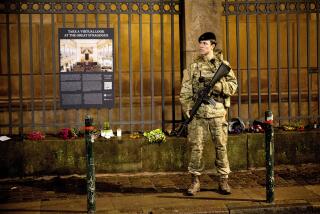Neo-Nazi Migration to Denmark From Germany Stirs Anger, Protests : Europe: Revelations about newcomers expose old wounds dating back to World War II, when the German army occupied the country.
- Share via
KOLLUND, Denmark — In his haven across the Flensborg fiord from Germany, Thies Christophersen has been quietly publishing magazines and books for years denying that the Holocaust ever happened.
The presence of the former German SS officer was long ignored by other residents of Kollund, a pleasant town filled with nearly identical bungalows and colorful front gardens.
But revelations about his international propaganda network and efforts by other German neo-Nazis to settle in Denmark exposed old wounds dating back to World War II, when the German army occupied the country.
Now, residents want Christophersen expelled to Germany. Protesters have staged at least two violent rallies to demand that Denmark tighten its liberal press freedoms law, a backlash that has put the government in the position of defending the right of Nazis to speak out.
“We’ve tolerated (Christophersen) because he was an old man and was alone. Now others are coming,” said Karen Heesch, a retiree in Kollund, a town of 1,500 people a few minutes north of the German border.
Christophersen came to Denmark to avoid charges in Germany of incitement to violence and racial hatred in 1986. Denmark has turned down Germany’s requests to extradite Christophersen because he holds a Danish residency permit. His work is protected by Denmark’s press law.
Attention focused on Christophersen after another immigrant Nazi had troubles. In mid-September, Meinolf Schoenborn, who heads Germany’s banned Nationalist Front, fled from his home in the southern Danish village of Kvaers after Danes attacked his house.
Press reports said Schoenborn had moved to Denmark with plans to set up a training camp for right-wing activists.
“What happened in Kvaers sent a shock wave through the country,” said Peter Rasmussen, who owns a bar in Graasten, a mile from Kvaers.
He predicted that if Christophersen stays and the press law is not changed, “protests will multiply and may get out of control.”
Two weeks after Schoenborn was driven from his home, about 2,000 people protested outside Christophersen’s house five miles from Kvaers.
The 76-year-old German has told reporters he could no longer stand the pressure and would surrender to German authorities. But Danes say Christophersen is bluffing.
“He can’t leave. He’s the spider in the center of an international web,” said Siegfried Matlock, editor in chief of Der Nordschleswiger, a German-language newspaper in Denmark.
In recent years, Christophersen has held meetings with leading European right-wing figures. The Copenhagen newspaper Det Fri Aktuelt said he printed the neo-Nazi publication Liberty Bells for distribution in the United States.
He prints a quarterly called Die Bauernschaft, which means “the peasantry” in German. Under the name Nordwind Publishing, he has produced his own book, “The Auschwitz Lie,” and others denying that Germany exterminated millions of Jews during World War II.
Christophersen, who says he was a guard at the Auschwitz concentration camp during the war, produces the publications from a small, yellow-brick house with shutters, boarded basement windows and a security camera to monitor surroundings. The house is just four miles from the Froslev camp, the German-run prison in Denmark during World War II.
When Schoenborn bought his house in Kvaers, he told the seller, Karsten Pedersen, he was setting up a business to sell toys.
“Strange toys, indeed,” said Pedersen, a car mechanic who says he did not know the buyer’s identity “until it was too late.”
After Schoenborn fled the house, T-shirts and stickers emblazoned with swastikas and other Third Reich emblems were found inside along with neo-Nazi literature.
Today, the house is sprayed-painted with anti-Nazi slogans and the surroundings are littered with barbed wire, broken glass and broken poles.
Schoenborn’s whereabouts are not known.
Other neo-Nazis have tried to make a home in Denmark.
“In one case, the seller retracted his offer when he discovered who was buying it,” Deputy Police Chief Bent Rungstrom said, refusing to identify either party.
The government has been reluctant to take harsh action. Legislators have promised to review the law on racism, but stress that freedom of speech is sacrosanct in Denmark.
Germany repeatedly has asked its northern neighbor to tighten its legislation, saying neo-Nazis produce hate propaganda in Denmark and then export it to Germany and other countries.
Nazi hunter Simon Wiesenthal appealed to Danish consciences, recalling how Danes smuggled 7,000 Jews to neutral Sweden in 1943 after learning they were to be sent to concentration camps by the German occupiers.
“These neo-Nazis do things which are against the Danish people’s sentiments,” Wiesenthal told Danish news media.
More to Read
Sign up for Essential California
The most important California stories and recommendations in your inbox every morning.
You may occasionally receive promotional content from the Los Angeles Times.













